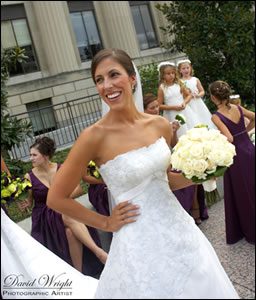Budgeting Basics
By Brooke Vaughan Schroeder
Congratulations, you are engaged!!!
General Guidelines:
Weddings can cost $2,000 to $2,000,000 but the average wedding for 150 runs $20,000-$30,000. The greatest factor that will affect your overall cost is the number of people you invite since the largest ticket item-food costs are dependent on the number of guests. Most wedding resources offer expenditure percentage guidelines for each wedding category. Below are some general percentages to use as helpful guidelines but they will fluctuate based
on your priorities.
–Reception 8% (location cost, rentals including tent, tables, chairs, linens, dinnerware etc.)
–Attire 10% (bride and groom’s attire including day of preparations like hair and make up)
–Flowers 8% (bouquets, boutonnieres, corsages for attendants and arrangements for the ceremony and reception)
–Photography/Videography 10% (services and photo/video packages)
–Music/Entertainment 8% for the ceremony (organist, harpist, vocalist etc.) and reception (DJ, band)
–Invitations/Stationary 3% (includes announcements, invitations and thank you notes)
–Gifts/Favors 3% (gifts for the wedding party and family and favors for the guests)
–Wedding Rings 2% (bands for husband and wife)
–Ceremony 2% (officiant fee, location costs and programs)
–Transportation 2% (bride and groom, wedding party and guests, parking attendants if needed)
–Miscellaneous 4% (extra expenses not accounted for-tip, overtime, taxes, last minute needs etc.)
Additional thoughts:
-Keep in mind if you hire a wedding coordinator/consultant they will take an additional 10% of the total budget.
-If you are paying for the honeymoon, don’t forget to factor that in.
-It would be wise to leave yourself another 5% cushion just to be safe.
No matter the size of the wedding, you still plan the same aspects just at different scales. As you are going through the process there are ways to save money in every aspect. Do your research first, call for several quotes and remember in some cases you can negotiate lower prices. Here are a few cost saving tips to keep in mind!
1. Time, day and date of wedding– traditionally the earlier in the day the more you save. Breakfast is less expensive than dinner. Also a Friday or Sunday wedding will be less expensive (location, entertainment, etc.) than a Saturday wedding because it’s the most popular day. Likewise, there are times of the year that are more popular and thus may be more expensive. Off-season months include: November and January through April. If you are planning a destination wedding, the off-season will vary per resort location and can mean a significant amount in savings especially for accommodations.
2. Style– a less formal affair is traditionally less expensive. Buffets cost less than seated meals, your backyard is more affordable than a ballroom, and plastic is cheaper than china!
3. Refreshments-alcohol is expensive and is a big budget line if you have a full open bar. Look into buying it yourself, consider offering just beer and wine or pass a signature drink to save money.
4. Entertainment-DJ’s are usually less expensive than bands.
5. Flowers– do them yourself or try to reuse arrangements from the rehearsal dinner or ceremony for the reception.
6. Transportation– borrow a friend’s car or other form of transportation instead of paying for it!
Once you decide on your budget, make sure you keep track of your expenditures and adjust your spending as needed. You may just want to keep your records on an excel file or you may want to use budgeting software. The knot (www.theknot.com) offers a free budget calculator that allows you to enter your budget, estimates your expenditures and tracks payments and due dates for you.
To sign up for the free service click here http://weddings.theknot.com/budgeter/Budgeter.aspx.
Now that you have a basic understanding of how wedding budgets are typically broken down, prioritize what is most important to you and allocate your finances accordingly. Enjoy the planning and don’t forget to keep track of your spending along the way. Best wishes!


